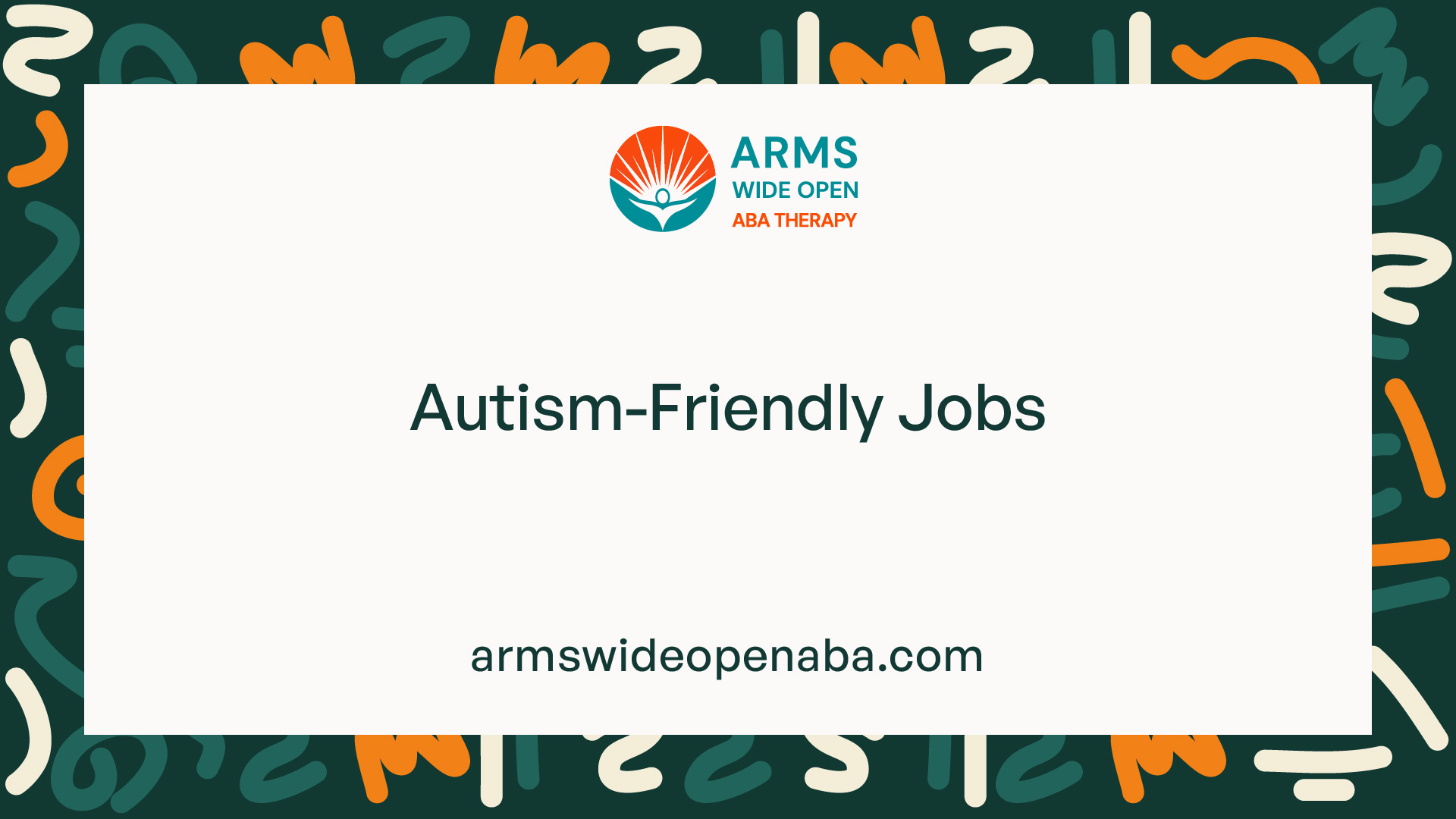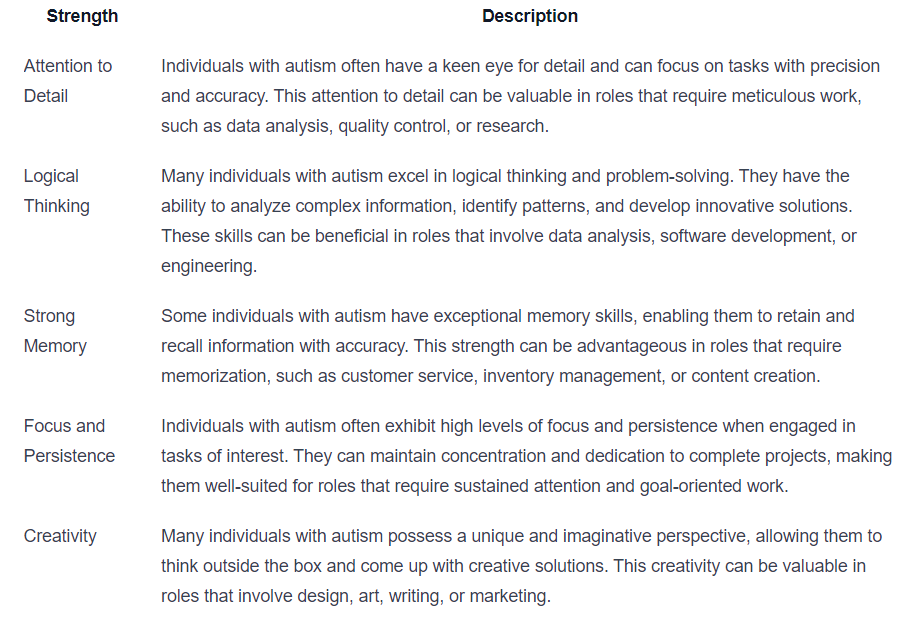Autism-Friendly Jobs
Discover autism-friendly jobs and unleash your potential! From identifying strengths to thriving in the workplace, we've got you covered.

Understanding Autism-Friendly Jobs
In the quest for meaningful employment, individuals with autism often thrive in environments that are specifically tailored to their unique strengths and abilities. Autism-friendly jobs are designed to provide a supportive and inclusive workplace environment that accommodates the needs of individuals on the autism spectrum. In this section, we will explore what makes a job autism-friendly and the benefits of working in such environments.

What Makes a Job Autism-Friendly?
Autism-friendly jobs are characterized by a range of factors that foster an inclusive and supportive environment for individuals with autism. Here are some key elements that make a job autism-friendly:
- Clear expectations and structure: Autism-friendly jobs often provide clear guidelines, routines, and clearly defined tasks, which can help individuals with autism thrive in their roles. Predictability and structure contribute to a sense of stability and reduce anxiety in the workplace.
- Sensory considerations: Sensory sensitivities are common among individuals with autism. Autism-friendly jobs take into account these sensitivities and provide a sensory-friendly environment. This may include minimizing sensory distractions, providing noise-cancelling headphones, or allowing flexible workspaces.
- Accommodations and modifications: Accommodations and modifications are crucial in creating an autism-friendly workplace. These may include providing visual supports, offering flexible work hours, implementing assistive technology, or assigning a mentor or job coach for support.
- Effective communication and social support: Autism-friendly jobs prioritize effective communication strategies and provide social support. This can involve clear and direct communication, regular check-ins, and fostering a supportive and understanding work culture.
Benefits of Autism-Friendly Workplaces
Autism-friendly workplaces offer numerous benefits for individuals with autism. Here are some key advantages:
Benefits
Inclusion and acceptance: Autism-friendly workplaces foster a sense of belonging and acceptance, creating an inclusive work culture where individuals with autism can thrive.
Utilizing strengths: Individuals with autism often possess unique strengths, such as attention to detail, strong memory, and analytical thinking. Autism-friendly jobs recognize and harness these strengths, allowing individuals to excel in their roles.
Reduced stress and anxiety: The supportive and accommodating nature of autism-friendly workplaces can help reduce stress and anxiety levels, enabling individuals to focus on their work and perform at their best.
Career growth and development: Autism-friendly jobs often provide opportunities for career growth and development. With the right support and accommodations, individuals with autism can progress in their chosen fields and achieve their professional goals.
Positive impact on mental health: Working in an autism-friendly environment can have a positive impact on mental health, promoting self-confidence, self-esteem, and overall well-being.
Understanding what makes a job autism-friendly and recognizing the benefits of working in such environments can empower individuals with autism to seek out opportunities that cater to their unique strengths and needs. By embracing inclusion and providing accommodations, employers can unlock the potential of individuals on the autism spectrum, creating a win-win situation for employees and businesses alike.
Identifying Strengths and Skills
In order to thrive in autism-friendly jobs, it's important to identify and leverage the unique strengths and skills that individuals with autism possess. This section will explore the common strengths of individuals with autism and highlight transferable skills that can be applied to various job roles.
Common Strengths of Individuals with Autism
Individuals with autism often possess a range of strengths that can contribute to their success in the workplace. While strengths can vary from person to person, some common strengths among individuals with autism include:

Transferable Skills for Various Job Roles
While individuals with autism may have specific strengths, they also possess transferable skills that can be applied to a wide range of job roles. These skills include:
- Communication Skills: Effective communication is essential in the workplace. Individuals with autism often develop strong written or verbal communication skills, allowing them to effectively convey information, collaborate with colleagues, and provide clear instructions.
- Analytical Skills: The ability to analyze and interpret data is highly valued in many industries. Individuals with autism often excel in analytical thinking, allowing them to gather, evaluate, and draw insights from information, making them well-suited for roles in research, finance, or data analysis.
- Organization and Time Management Skills: Individuals with autism often have a strong sense of structure and organization. They can effectively manage tasks, prioritize responsibilities, and adhere to deadlines, making them valuable assets in roles that require organization and time management.
- Problem-Solving Skills: Individuals with autism often possess excellent problem-solving abilities. They can identify challenges, develop strategies, and implement solutions, making them well-suited for roles that require critical thinking and innovative problem-solving.
- Computer and Technical Skills: Many individuals with autism have a natural affinity for technology. They often possess advanced computer skills, including proficiency in software applications, programming languages, or technical troubleshooting, making them valuable in roles that require technical expertise.
By recognizing and harnessing these strengths and transferable skills, individuals with autism can excel in a variety of job roles. Employers can tap into the unique contributions of individuals with autism by providing inclusive and supportive work environments, fostering diversity, and embracing the talents they bring to the table.
Job Search Strategies
When seeking autism-friendly jobs, it's important to employ effective job search strategies that can help individuals with autism find suitable employment opportunities. This section will explore two key strategies: researching autism-friendly companies and networking to build connections.
Researching Autism-Friendly Companies
Researching autism-friendly companies is an essential step in identifying potential employers who prioritize creating inclusive work environments. These companies actively implement policies and practices that support individuals with autism throughout the hiring process and in the workplace.
To research autism-friendly companies, individuals with autism can utilize various resources such as:
- Autism advocacy organizations: These organizations often maintain lists or databases of companies that have taken steps to create autism-friendly workplaces. Examples include Autism Speaks and the Autism Society.
- Online job platforms: Many job search websites now provide filters or categories specifically for autism-friendly jobs. This allows individuals to browse through job listings that are tailored to their needs.
- Company websites: Visiting the websites of potential employers allows individuals to gather information about the company's commitment to inclusivity and any specific initiatives or programs they have in place to support individuals with autism. Look for diversity and inclusion statements, employee resource groups, or testimonials from employees with disabilities.
- Social media: Following autism-friendly organizations or companies on social media platforms can provide insights into their culture, values, and commitment to inclusivity. Companies may share stories or initiatives related to supporting employees with autism.
By conducting thorough research on autism-friendly companies, individuals with autism can focus their job search efforts on organizations that are more likely to provide a supportive and inclusive work environment.
Networking and Building Connections
Networking plays a vital role in any job search, and it can be particularly beneficial for individuals with autism. Building connections allows individuals to tap into unadvertised job opportunities and gain valuable insights from professionals in their field of interest.
Here are some networking strategies to consider:
- Join autism-related groups and communities: Participating in autism-related groups, both online and offline, can provide opportunities to connect with individuals who have similar experiences or who may have information about autism-friendly job openings.
- Attend career fairs and industry events: Career fairs and industry events offer a platform to meet potential employers and professionals in specific fields. Engaging in conversations and exchanging contact information can lead to future opportunities.
- Utilize professional social networks: Platforms like LinkedIn can be valuable for networking. Individuals can join relevant groups, follow companies of interest, and connect with professionals in their desired industry.
- Reach out to support organizations: Local autism support organizations may have connections with employers or be able to provide guidance on finding autism-friendly jobs. They may also host events or workshops focused on employment opportunities for individuals with autism.
Networking allows individuals to expand their professional circles, gain insights into different industries, and potentially discover hidden job opportunities that may not be advertised. By building relationships and fostering connections, individuals with autism can increase their chances of finding suitable employment opportunities.
Employing effective job search strategies, such as researching autism-friendly companies and networking, can help individuals with autism navigate the job market and uncover opportunities where they can thrive.
Job Application and Interview Tips
When applying for autism-friendly jobs, certain strategies can help individuals with autism present their strengths and skills effectively during the job application and interview process. This section will provide guidance on crafting a resume and cover letter, as well as preparing for interviews.
Crafting a Resume and Cover Letter
Crafting a well-written resume and cover letter is essential to make a positive impression on potential employers. Here are some tips to keep in mind:
- Highlight relevant experience: Focus on your relevant skills and experiences that align with the job requirements. Emphasize any accomplishments or achievements that demonstrate your abilities.
- Use clear and concise language: Keep your resume and cover letter clear, concise, and easy to read. Use bullet points to highlight key information and avoid lengthy paragraphs.
- Include transferable skills: Highlight transferable skills that are relevant to the job you are applying for. These may include attention to detail, problem-solving, organization, or strong analytical skills.
- Tailor your application: Customize your resume and cover letter for each job application. Research the company and the specific role you are applying for, and align your application to match their requirements and values.
- Proofread and edit: Ensure that your resume and cover letter are free of grammatical errors and typos. Proofread them multiple times or ask someone else to review them before submitting.
Preparing for Interviews
Preparing for interviews is crucial to showcase your abilities and make a positive impression. Here are some tips to help you prepare:
- Research the company: Familiarize yourself with the company's mission, values, and culture. This will allow you to align your responses with their expectations and demonstrate your interest in the organization.
- Practice common interview questions: Prepare responses to common interview questions such as "Tell me about yourself" or "Why are you interested in this position?" Practice your answers to help build confidence and ensure clarity in your responses.
- Utilize visual aids: If visual aids assist you in communication or understanding, consider bringing them to the interview. This may include a portfolio of your work, examples of projects you have completed, or any visual aids that help you explain your skills and experiences.
- Ask questions: Prepare a list of thoughtful questions to ask the interviewer. This shows your interest in the role and provides an opportunity to gain more information about the company and the position.
- Practice self-care: Prioritize self-care before the interview to help manage any anxiety or stress. Get a good night's sleep, eat a nutritious meal, and engage in activities that help you relax and feel confident.
By following these tips, individuals with autism can effectively present themselves during the job application process and prepare for successful interviews. Remember to emphasize your unique strengths and skills, and showcase your ability to contribute positively to the workplace.
Thriving in the Workplace
To flourish in an autism-friendly job, individuals with autism can benefit from understanding the workplace accommodations and support available to them, as well as employing effective self-advocacy and communication strategies.
Workplace Accommodations and Support
Autism-friendly workplaces recognize the unique needs of individuals with autism and provide accommodations and support to foster success and productivity. These accommodations can vary depending on the specific requirements of the individual. Examples of workplace accommodations may include:
- Flexible work schedules: Allowing individuals to adjust their work hours or work remotely can help accommodate sensory sensitivities or other challenges.
- Sensory-friendly environments: Creating a workspace that minimizes noise, bright lights, and other sensory triggers can promote a more comfortable work environment.
- Clear communication channels: Providing clear and concise instructions, written or visual aids, and utilizing assistive technologies can enhance communication and understanding.
- Task modifications: Adjusting job tasks or providing additional training and support can help individuals with autism effectively accomplish their responsibilities.
- Supportive colleagues and supervisors: Encouraging a culture of acceptance and understanding within the workplace can create a supportive and inclusive environment.
By implementing these accommodations, employers can create an environment where individuals with autism can thrive and contribute their unique talents and skills.
Self-Advocacy and Communication Strategies
Self-advocacy and effective communication are essential skills for individuals with autism to thrive in the workplace. Here are some strategies that can be helpful:
- Self-awareness: Understanding one's strengths, challenges, and preferred working styles can guide individuals in communicating their needs effectively.
- Disclosure: Deciding whether or not to disclose an autism diagnosis is a personal choice. If an individual chooses to disclose, it can help open up conversations about necessary accommodations and support.
- Self-expression: Developing effective communication skills, such as clear verbal and written communication, active listening, and non-verbal communication, can facilitate interactions with colleagues and supervisors.
- Requesting accommodations: Advocating for necessary accommodations by clearly communicating specific needs to supervisors or human resources can help create a more supportive work environment.
- Seeking support: Utilizing available resources, such as employee assistance programs, mentorship programs, or autism support groups, can provide additional guidance and support.
By employing these self-advocacy and communication strategies, individuals with autism can actively participate in the workplace, contribute their unique perspectives, and enhance their overall job satisfaction and success.
Thriving in an autism-friendly job requires an understanding of the workplace accommodations and support available, as well as effective self-advocacy and communication strategies. By leveraging these resources and skills, individuals with autism can create a positive and fulfilling work experience.
Continuing Growth and Development
As individuals with autism find employment in autism-friendly jobs, it's important to prioritize ongoing growth and development. This section explores professional development opportunities and strategies for building a successful career path.
Professional Development Opportunities
Continued learning and skill development are essential for individuals with autism to excel in their chosen careers. There are various professional development opportunities available that can enhance their knowledge, strengthen their skills, and promote career advancement. Some of these opportunities include:
Professional Development Opportunities
Continuing Education Programs
Workshops and Training Sessions
Webinars and Online Courses
Mentoring Programs
Professional Associations and Networking Events
Taking advantage of these opportunities allows individuals with autism to stay updated on industry trends, expand their skill set, and engage with peers and professionals in their field. By investing in their professional development, they can enhance their career prospects and increase their value in the job market.
Building a Successful Career Path
Building a successful career path requires careful planning and deliberate actions. Individuals with autism can take several steps to navigate their career progression effectively. Here are some strategies to consider:
- Set Clear Goals: Define your long-term career goals and break them down into smaller, achievable milestones. This will provide a sense of direction and purpose.
- Seek Mentorship: Find mentors within your industry who can provide guidance, advice, and support. Mentors can offer valuable insights, help navigate challenges, and provide networking opportunities.
- Networking: Build professional connections by attending industry events, joining relevant associations, and engaging in online networking communities. Networking can open doors to new opportunities and help establish a strong professional network.
- Embrace Continuous Learning: Stay updated on industry trends, technologies, and best practices. Seek out learning opportunities through workshops, conferences, and online resources. Continuous learning demonstrates a commitment to professional growth and can open doors to new roles and responsibilities.
- Seek Feedback: Actively seek feedback from supervisors, colleagues, and mentors. Constructive feedback can help identify areas for improvement and provide valuable insights to enhance job performance.
- Emphasize Transferable Skills: Highlight transferable skills in your resume and during interviews. These skills, such as problem-solving, attention to detail, and analytical thinking, can be valuable across various job roles and industries.
By actively pursuing professional development and implementing strategies for career growth, individuals with autism can unlock their full potential in the workplace. With dedication, perseverance, and a focus on continuous improvement, they can build rewarding and fulfilling careers.
Sources
https://leafwingcenter.org/autism-friendly-jobs/
https://www.verywellhealth.com/top-autism-friendly-employers-4159784
https://uk.indeed.com/q-autistic-friendly-jobs.html
Similar articles
We’re here to help you

Our team is here to assist you in this process. Contact us for any assistance.
it’s easy to apply
We Accept Most Insurances
Our in-network insurance partnerships make ABA therapy more accessible to families throughout our service areas.







Our Insurance Process
We'll request your insurance details to help us verify your plan's coverage for ABA therapy. Once we've received this information, we'll walk you through your benefits, including copayments, deductibles and out-of-pocket maximums, so you know what to expect in advance.
Our team will then handle the preauthorization and all the necessary paperwork.
.svg)





















.jpeg)


































.jpeg)




.jpeg)







.jpeg)











.jpeg)
















